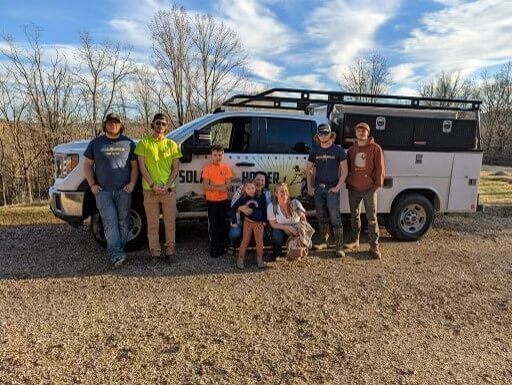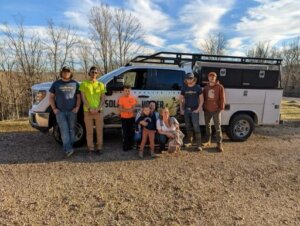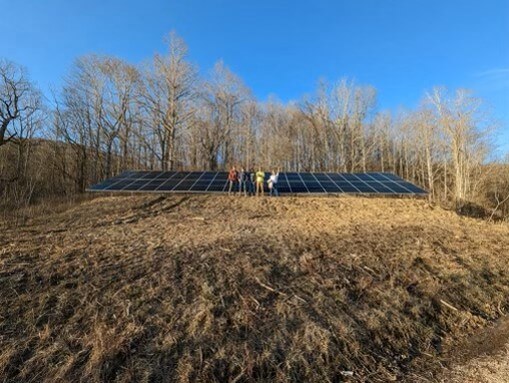
How to Use SFF Funding For Your NONPROFIT
Build a brighter future for your nonprofit and community by powering your organization with solar energy! Adding solar panels can bring big cost savings to your bottom line.
Nonprofit organizations, including homeless shelters, educational institutions, medical centers, and faith institutions, can apply for a direct grant sub-award to offset up to 20% of total project cost from the Appalachian Solar Finance Fund to build your next solar project. The SFF also supports roof repair funding for buildings needing cost assistance for pre-solar roof maintenance or replacement – up to 20% of the total cost of roof repair, up to $20,000 per project.
Get inspired! How could these solar projects help your nonprofit?
- Enjoy long-term energy cost savings
- Hedge against rising utility costs
- Build climate resilience
- Meet organizational sustainability goals
- Be a renewable energy leader in your community
SFF can help make your solar power dream a reality!
If you have a BIG dream, let us know! The SFF can help get your solar project off the ground by unlocking funding and financing opportunities for high-need, high-impact projects.
In addition to direct project funding, the SFF has built a solution to cover a short-term solar financing need created by the 2022 federal Inflation Reduction Act (IRA). The IRA has established for the first time a direct payment option to allow tax-exempt entities to access the value of the federal energy Investment Tax Credit (ITC). This tax credit offsets 30% or more of a solar project’s total cost! It’s great news for nonprofits and public institutions seeking to go solar. But it also means that many nonprofits and public institutions may need short-term bridge financing to cover the time gap between a solar project’s construction and the federal government’s eventual remittance of the ITC.
The SFF can help support these emerging solar financing needs by providing short-term low- to zero-interest bridge loans for impactful solar projects via our partner organization Invest Appalachia (IA). The SFF also can award sub-grants to offset interest and fees accrued on ITC bridge loans issued by traditional lenders for nonprofit and public solar projects.
Moreover, the SFF and IA have developed a flexible suite of solar credit enhancements, including interest-rate buydowns and loan guarantees, to help leverage large-scale repayable investment into promising solar projects that face financing obstacles related to risk migration, cost of capital, or timing of investment. These innovative financial tools are designed to absorb risk and/or cost to help secure the overall capital stack for an impactful project.
Apply for funding or technical support for solar projects
With so many funding and financing solutions, why not dream up a solar project for your nonprofit today? The SFF accepts applications on a rolling basis. Get all the details here – https://solarfinancefund.org/index.php/apply/.
GRANTEE HIGHLIGHT
 High Rocks Educational Corporation operates an award-winning educational program for young people ages 12-29 focused on empowerment, critical thinking, and leadership. Located in the mountains of Pocahontas County, West Virginia, the nonprofit organization added a 19-kW ground-mounted solar PV array to their property in early 2023. Installed by West Virginia-based solar development firm Solar Holler, the total upfront system cost of $56,275 was offset by $14,630 received in SFF funding support, plus 30% or more in expected repayment of the federal solar Investment Tax Credit and associated bonus credits. The project will have a lifetime financial benefit of more than $53,000.
High Rocks Educational Corporation operates an award-winning educational program for young people ages 12-29 focused on empowerment, critical thinking, and leadership. Located in the mountains of Pocahontas County, West Virginia, the nonprofit organization added a 19-kW ground-mounted solar PV array to their property in early 2023. Installed by West Virginia-based solar development firm Solar Holler, the total upfront system cost of $56,275 was offset by $14,630 received in SFF funding support, plus 30% or more in expected repayment of the federal solar Investment Tax Credit and associated bonus credits. The project will have a lifetime financial benefit of more than $53,000.
“The Appalachian Solar Finance Fund [support] allowed us to add more solar panels to the original project and really jump-started implementation,” says High Rocks Executive Director Sarah Riley. “Without the tax credit incentives and programs like the Appalachian Solar Finance Fund, we’d have to come up with $20,000 on our own, which I don’t think we would have ever been able to afford to do.”
The High Rocks Solar Project was featured in this Charleston Gazette-Mail article by Mike Tony on December 30, 2022. 
